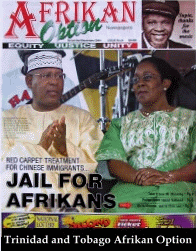The original URL of this article is:
www.africaspeaks.com/afrikanoption/2004/25012005.html
Who will protect the poor?
$28 billion money madness
November/December 2004 Issue No. 21
Published in Trinidad and Tobago
Posted: January 25, 2005

|
Whilst not even the Opposition United National Congress (UNC) mounted a successful attack on the philosophy of the 2004 – 2005 National Budget; there are issues that have not been addressed during the debate. There was an apparent lack of focus by the opposition relative to the implementation of fiscal measures.
The UNC, and Mr. Basdeo Panday in particular, chose not to treat the budget as a fiscal document and challenge any perceived defects or negative philosophy. Instead they chose to raise issues which they hope would destroy Mr. Manning's and by extension, the creditability of the People's National Movement (PNM).
Mr. Panday's contribution was most inappropriate and sounded like a campaign speech during election time. It denied the population of information needed to ascertain if the PNM would be able to implement their budget proposals.
There seemed to be an obsession with the quarrying operations being conducted at Valencia by Jammat Al Muslimeen leader Yasin Abu Bakr, instead of the fiscal measures contained in the budget and its impact on the poor. Such an issue had no place on the budget debate agenda purely because it was merely a repeat performance of Trinidad Express Special Investigation columnist Camini Maharaj on the said issue.
The more important issues like the philosophy of the budget, which the PNM says will address the needs of the poor and whether the implementation structures are being put in place, these issues were ignored by most Opposition responses.
Mr. Manning has certainly struck a positive note by placing a greater emphasis on education and social services. However, yet again, we will miss the boat, because the structures are not in place to ensure that those who are most in need of the proposed benefits would receive them.
The Opposition failed to raise the issues relative to the implementation of proposals in last year's budget. What were the benefits derived from the $600m allocated to the AIDS programme? Who benefitted from that money? Has the AIDS epidemic been reduced or has the money been creamed off at the top by unscrupulous businessmen and corrupt State Officials? These are some if the issues that have to be addressed if we are to determine the success or failure of last year's budget and be guided as to how we should analyse the current proposals.
Faced with the enormous figure of 28 billion dollars for a national budget for a nation of 1.3 million people, we are faced with the reality of massive fraud and corruption if there is inadequate structure to deal with the disbursements of funds.
There is dire need to address the rampant social decay in the lives of too many of our citizens, who live under the poverty line. We must ensure that what occurred with the last economic boom (where a few people at the top along with their foreign multi-national bosses, took not just the cake, but the entire bakery, leaving the poor to fight each other for the few crumbs that remained) does not happen again.
Twenty eight billion dollars is an enormous sum of money for the national budget of such a small nation. It means that each citizen in this country, if given his or her individual share, would be a multi-millionaire. If that is the reality, why is there so much poverty?
The real problem lies in our inability to demand that the government of the day implement measures that would allow for communal governance. Such a system would afford people's participation and ensure better accountability.
The structures that would assist the stabilization of the economic and social safety net would be manned by the people in the various communities; who are most qualified to identify their community needs and how best to address those needs.
It is of paramount importance that we, as a people, ensure that we protect the benefits that are derived from our natural resources which do not have an indefinite life span; therefore, when it no longer exists, our lives and those of our future generation will not be jeopardised.
In light of the fact that we do not have control over our economic resources or the price that is derived from such sales, we should ensure that it is properly utilized to benefit all by making demands on the government that the communities must be actively involved in the preparation and implementation of the budget and its measures.
AfricaSpeaks.com, RastaSpeaks.com and RastafariSpeaks.com at www.africaspeaks.com grants permission to cross-post original articles in their entirety on community Internet sites, as long as the text and titles of the articles are not modified. The source must be acknowledged as follows: AfricaSpeaks.com at www.africaspeaks.com. The active URL hyperlink address of the original article and the author's copyright note must be clearly displayed as follows: Copyright © 2004 - 2005 AfricaSpeaks.com, www.africaspeaks.com, and not like this: www.africaspeaks.com. Check with the original copyright holder, where applicable, for articles from other sources. For publication of africaspeaks.com articles in commercial sites, print and other forms, contact us at iditor@rastafarispeaks.com.
Copyright © 2004 - 2005 AfricaSpeaks.com
|
|